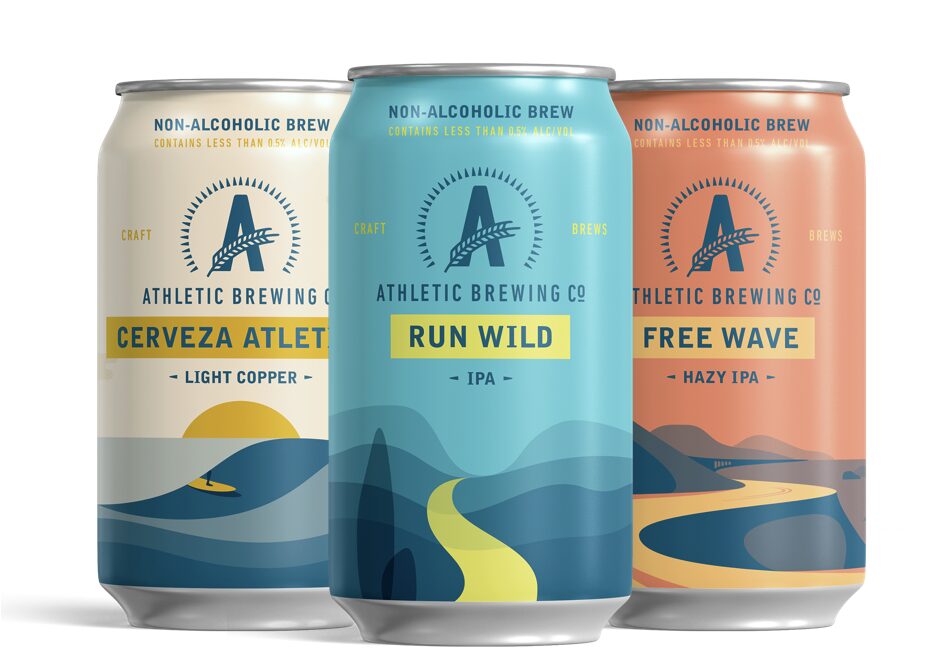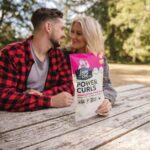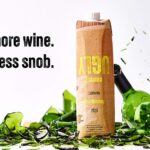I am one of those odd ducks who don’t like beer. The smell and the taste does nothing for me.
When I tried it in college, it was unappealing and didn’t interest me. (Note: most of my college friends were from Pittsburgh, so they drank Iron City Beer, which may have been part of the issue.)
But when I get a whiff about true beer innovation, I admire the fragrance of disruption and brilliance.
Athletic Brewing Company has emerged as a revolutionary force, challenging conventional wisdom about what beer drinkers want in an industry dominated by alcohol-focused traditions and consumption habits spanning centuries.
Founded in 2017, this non-alcoholic beer company has created a new category within the beverage industry and redefined how consumers think about socializing, wellness, and the very concept of beer itself.
The Founder’s Journey: From Passion to Purpose
Bill Shufelt’s path to founding Athletic Brewing wasn’t the typical entrepreneur’s journey. As a successful hedge fund manager at Point72 Asset Management, Shufelt had built a career in finance, but found himself increasingly uncomfortable with how alcohol consumption was affecting his health, fitness goals, and productivity.
An avid runner and fitness enthusiast, Shufelt experienced a pivotal moment when training for an ultramarathon in his early 30s. The common practice of giving up alcohol during training periods made him realize there were no quality non-alcoholic options available for those who wanted to enjoy the social aspects of drinking beer without alcohol.
“I would be out with friends or colleagues, and my options were either sugary sodas or water,” Shufelt has recalled in interviews.
“I started wondering why no one was making great-tasting craft non-alcoholic beer that felt like a proper adult beverage.”
Two years of market research followed, during which Shufelt discovered a significant gap in the market. While approximately 30% of American adults don’t drink alcohol, and another large segment is actively reducing consumption, quality non-alcoholic options are virtually non-existent in the craft beer space.
Shufelt left his finance career in 2016 and partnered with award-winning brewer, ironically named John Walker, (Johnny Walker Scotch/Whiskey) who shared his vision for creating full-flavored non-alcoholic craft beers.
Together, they opened the first brewery in the United States dedicated exclusively to non-alcoholic craft beer in Stratford, Connecticut, in 2018.
Three Key Marketing and Branding Strategies
Athletic Brewing’s remarkable growth—reaching over $37 million in sales by 2021 and securing distribution in all 50 states—can be attributed to several brilliant marketing and branding decisions.
By 2023, industry analysts estimated their annual revenue had climbed to approximately $90 million, capturing nearly half of the craft non-alcoholic beer market in the United States. Recent valuations have them worth $800M.
This financial success attracted significant investment, including a $50 million funding round led by Keurig Dr Pepper in 2022 and another $75 million in 2023, which helped fund their expansion to a second brewing facility in San Diego, quadrupling their production capacity.
What’s particularly impressive is that Athletic achieved this growth while maintaining premium pricing—their six-packs typically retail between $11.99 and $13.99, positioning them at price parity with alcoholic craft beers rather than competing on discount with traditional non-alcoholic options.
This pricing strategy improved margins and reinforced their brand positioning as a premium craft product worthy of respect among beer enthusiasts.
Here are the three most impactful strategies that propelled their success:
1. Positioning Around Athletic Lifestyle, Not Sobriety
Perhaps the most crucial branding decision Athletic Brewing made was connecting its product to active lifestyles rather than positioning it as a “sober” alternative.
The very name “Athletic Brewing” communicates that this beer is for people who care about performance, fitness, and wellness—not exclusively for those avoiding alcohol for recovery reasons.
This positioning brilliantly sidestepped the stigma often associated with non-alcoholic beverages and created an aspirational brand that appeals to health-conscious consumers who still want to participate in beer culture. Their tagline, “Brew Without Compromise,” reinforces that consumers don’t have to sacrifice taste or social experiences when choosing non-alcoholic options.
Their marketing consistently features outdoor activities, runners, cyclists, hikers, and other active pursuits—visually connecting their product to moments of achievement rather than moments of abstention. This positive framing has been instrumental in their crossover appeal to non-drinkers and traditional beer enthusiasts looking to moderate their consumption.
2. Premium Craft Beer Aesthetics, Taste, and Experience
Athletic Brewing deliberately positioned their products as premium craft beer rather than a lesser substitute for “real beer.” Everything from their packaging design to their brewing process communicates craft credentials:
The company’s designs feature bold colors, clean typography, and outdoor imagery that look right at home in any craft beer refrigerator. They created beer styles familiar to craft enthusiasts—IPAs, golden ales, stouts—with names like “Run Wild” and “Free Wave” that reinforce their product’s lifestyle positioning and freedom.
Perhaps most importantly, they invested heavily in brewing technology and processes to create non-alcoholic beers with the complex flavor profiles craft beer drinkers expect.
Unlike many non-alcoholic beers that remove alcohol after brewing (often affecting taste), Athletic developed proprietary brewing methods that limit alcohol production from the start.
By maintaining the artisanal, small-batch aesthetic of craft brewing culture while delivering on taste, Athletic effectively created products that drinkers are proud, not embarrassed, to order or display.
3. Direct-to-Consumer Focus with Community Building
While most beer companies rely heavily on traditional distribution channels, Athletic Brewing established a robust direct-to-consumer e-commerce platform. This strategy proved particularly valuable during the COVID-19 pandemic but was a differentiator well before that crisis.
Their “Athletic Club” subscription service creates recurring revenue while building customer loyalty and providing valuable consumer data. More importantly, it established direct relationships with customers that traditional brewers, working through distributors, don’t have.
Athletic has leveraged these direct relationships to build a passionate community. Their social media presence doesn’t just promote products—it celebrates customer achievements, shares user-generated content of people enjoying Athletic beer during adventures. It creates conversation around brewing and active lifestyles.
The company further strengthened community ties through its “Two for the Trails” program, which donates 2% of sales to trail restoration and maintenance projects. This purpose-driven initiative resonates deeply with their outdoor-enthusiast customer base and reinforces the authentic connection between the brand and active lifestyles.
The Halo Effect: How NA Beer Increases Overall Beverage Sales
One of the most interesting aspects of Athletic Brewing’s growth has been its effect on the broader beverage landscape, particularly in bars and restaurants. Contrary to initial skepticism from venue owners concerned that non-alcoholic options would cannibalize higher-margin alcoholic sales, evidence suggests the opposite is occurring.
Research from on-premises analytics firm CGA Strategy shows that establishments offering quality non-alcoholic beer options like Athletic Brewing see an increase in overall beverage sales by approximately 8-10%. There are several reasons for this “halo effect”:
First, these options extend drinking occasions.
When consumers know they can switch to a non-alcoholic option later in the evening, they’re more likely to start with alcoholic beverages rather than skipping drinks altogether.
Second, they bring in new customers.
Groups with mixed drinking preferences are more likely to choose venues where everyone can have a satisfying beverage experience.
James Kellow, beverage director for a national restaurant group, explains:
“We’ve found that offering premium non-alcoholic options like Athletic creates longer customer stays and larger party sizes. The person who might have declined joining friends for ‘drinks’ now participates, orders food, and contributes to the social atmosphere—while their friends still order alcohol.”
Additionally, premium non-alcoholic beers command higher price points than sodas or water, improving profit margins on what would otherwise be low-value sales. At many establishments, Athletic Brewing’s options are priced just $1-2 below alcoholic craft beers, representing significantly better margins than traditional non-alcoholic alternatives.
Expert Perspectives: Fad or Fundamental Shift?
Is the growth of non-alcoholic beer a temporary trend or a lasting change in consumer behavior? Industry experts increasingly point to structural shifts in consumer preferences that suggest non-alcoholic options are here to stay.
Brandy Rand, Chief Strategy Officer at IWSR, the leading global data and intelligence company for alcoholic beverages, sees this as a fundamental change: “What we’re witnessing isn’t just a fad but a larger moderation movement.
Younger consumers are redefining their relationship with alcohol, seeking balance rather than abstinence. Data shows that 58% of non-alcoholic beer consumers also regularly purchase alcoholic beer—they’re not replacing alcohol entirely but integrating non-alcoholic options into their lifestyle.”
The numbers support this view.
While overall beer consumption has declined in recent years, the non-alcoholic beer category grew by over 38% in 2020 and continued strong growth through 2021-2024. Athletic Brewing has led this charge, growing from a startup to commanding over 45% of the U.S. craft non-alcoholic beer market in just a few years.
Julia Herz, former Craft Beer Program Director at the Brewers Association, points to broader cultural shifts:
“Athletic Brewing understood before most that modern consumers want options that fit their lifestyle without compromise. The quality revolution in non-alcoholic beer isn’t just changing what people drink and how the industry thinks about innovation. We’re seeing legacy brewers rush to develop their non-alcoholic options because they recognize this isn’t temporary—it’s a permanent expansion of categories.”
Major beverage companies’ actions reinforce this perspective. Investments in Athletic Brewing from companies like Keurig Dr Pepper ($50 million in 2022) and celebrities like J.J. Watt and Blake Griffin demonstrate the industry’s belief in the longevity of this segment.
Key Startup Observations from Athletic Brewing’s Success
Athletic Brewing’s journey offers valuable lessons for entrepreneurs in any category. Here are three key observations that apply broadly to startup success:
1. Solve Real Problems, Even in Traditional Industries
Athletic Brewing succeeded by addressing a genuine consumer need rather than creating an incremental improvement to existing products. By recognizing that a significant portion of adults wanted to participate in beer culture without alcohol consumption, they created an entirely new category within a centuries-old industry.
The lesson for startups is clear: Look for the unmet needs hiding in plain sight, particularly in established industries where incumbent players have blind spots.
Athletics success came not from chasing trends but from solving a persistent problem that traditional brewers had ignored.
2. Build Community Before Scale
While many startups focus on rapid distribution and scale, Athletic Brewing prioritized building authentic connections with its core audience. Their direct-to-consumer approach, community engagement, and cause-related initiatives created passionate brand advocates who spread the word organically.
This community-first approach meant that when they did expand distribution to traditional retail channels, they already had a built-in audience of enthusiastic customers. For startups, this demonstrates the power of developing deep relationships with early adopters rather than pursuing breadth before depth.
3. Reframe Limitations as Differentiation
Athletic Brewing turned what could have been seen as a limitation—the lack of alcohol—into its core differentiator by connecting it to positive lifestyle choices. Rather than positioning its product as what it lacks, it focuses on what it enables: performance, health, inclusion, and fuller participation in life.
This principle applies across industries: Successful startups often take what others see as constraints and transform them into unique value propositions. By changing the conversation around non-alcoholic beer from deprivation to enablement, Athletic created an entirely new narrative that resonated with consumers.
Athletic Brewing’s success illustrates that true innovation often comes not from creating entirely new products, but from fundamentally rethinking existing categories through evolving consumer values.
Their story reminds us that in marketing, as in brewing, the most potent transformations often come from questioning assumptions about what consumers want—and delivering it without compromise.
For those who are exploring the NA beer category, my daughter @fannyslater has many recommendations and reviews that she does on Instagram here: https://www.instagram.com/stories/highlights/17857005591190735/
Fanny has been sober for more than four years, and NA Beers solves the problem and the need for the taste of beer, without the alcohol.
Connect with Jeff at The Marketing Sage Consultancy. Interested in setting up a call with me? Use my calendly to schedule a time to talk. The call is free, and we can discuss your brand and marketing needs.
If you want to learn more about my new offering, The Trusted Advisor Board, you can click here to learn the details. Feel free to email me at jeffslater@themarketing sage.com or text 919 720 0995. Thanks for your interest in working with The Marketing Sage Consultancy.





